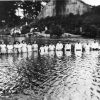calsfoundation@cals.org
George Washington Baines (1809–1882)
George W. Baines was a prominent nineteenth-century Southern Baptist minister, teacher, Arkansas politician, and president of Baylor University. His great-grandson, Lyndon Baines Johnson, was the thirty-sixth president of the United States.
George Washington Baines was born on December 29, 1809, in Chowan County, North Carolina. He was one of ten children born to Thomas Baines, who was a Baptist minister, and Mary McCoy Baines.
When he was eight, his family briefly lived in Georgia before settling on a farm near Tuscaloosa, Alabama, in 1818. His early education was obtained in the rural schools. He later attended the University of Alabama but withdrew in 1836 due to gastrointestinal health reasons. He was later awarded an AM degree by the university.
In 1834, he followed in his family’s footsteps (both his father and grandfather were ministers) and was licensed to preach by the Philadelphia Baptist Church in Tuscaloosa County. He was formally ordained two years later. Baines eagerly pursed his ministerial career, which took him to Arkansas, Louisiana, and Texas.
As his health deteriorated, he decided to move west to seek relief in a different climate. In 1837, he settled in Carroll County, Arkansas, along Crooked Creek, about two miles southwest of present-day Harrison (Boone County); the area today lies in Boone County. After settling in, he resumed his religious calling, helping to establish three churches, where he then preached. He also served as a missionary for the Baptist Home Mission Society of New York.
In 1842, Baines was elected as a Democrat to the Arkansas General Assembly representing Carroll County. He would serve only one term. He was elected at a time in Arkansas when state-operated banks were at risk of failing. During the election, there was a movement to clear out government officials who had close connections to the banks. As one newspaper stated: “Let good solvent, industrious, and intelligent FARMERS be selected.” Baines was judged to be such a man.
During his term, he served on several select committees, introducing resolutions asking the U.S. Congress to turn over “refuse lands” and one to create Newton County. He also worked with his fellow legislators to establish common schools in the state and to adopt the paper ballot instead of voice voting.
During the dispute over the banks, he served on a committee to examine the role of Senator Ambrose Sevier. He was one of two members of the committee who did not fully support a report issued by the committee critical of Sevier’s actions. Baines delivered a speech on the floor of the legislature explaining that he believed that Sevier had committed errors but that he would still support the senator in his office.
In 1844, the Crooked Creek Baptist church split over a number of issues, including the doctrine of predestination. The church became so embroiled in the controversy that Baines and his wife, Melissa Ann Butler Baines, whom he had married in 1840, were expelled from the church.
After his expulsion, he and his wife moved to Mount Lebanon, Louisiana, so he could continue his preaching. During his six years in Louisiana, he was the founding minister of the Saline Baptist Church and helped organize the North Louisiana Baptist Convention. He served as the second president of the convention and, in 1849, was a delegate to the Southern Baptist Convention in Nashville, Tennessee. Baines also served as superintendent of schools in Bienville Parish.
Baines continued his westward movement by relocating to Huntsville, Texas, in 1850. While in Texas, he pastored eight churches and became a religious advisor and lifelong friend of Sam Houston. In 1855, Baines became the editor of the first Baptist newspaper in Texas, the Texas Baptist. He served as the paper’s editor until 1860.
Baines served as a trustee for present-day Baylor University, then located in Independence, from 1851 to 1859. He and his wife also served as boarding house parents for the university’s female division. He left Baylor to take the position of pastor of the Independence Baptist Church but returned after the resignation of university president Rufus Burleson in 1861. He served as president from 1861 to 1863 and also taught science. With the outbreak of the Civil War, these proved to be difficult years for the university. Financially, the school suffered, and enrollment dropped drastically, with over 150 students discontinuing their education to join Confederate forces. After serving for two years, Baines gave up the difficult position.
Shortly after leaving Baylor, Baines moved to Fairfield, Texas, where his wife died. Over the years, the couple had raised ten children. In 1865, Baines married widow Cynthia W. Williams. Baines continued his ministerial duties and traveled as the field agent of the Baptist State Convention. In 1867, he moved to Salado, Texas, serving as pastor of the First Baptist Church. He later worked as the agent for the Education Commission of the Baptist State Convention.
After the death of his second wife in 1878, he moved in with his daughter, Anna, in Belton, Texas. In the winter of 1882, he contracted malaria and died on December 28. He is buried in the Old Salado Graveyard in Salado, Texas. His home in Salado was placed on the National Register of Historic Places in 1983.
For additional information:
Hinson, E. Glenn. A History of Baptists in Arkansas 1818–1878. Little Rock: Arkansas Baptist Convention, 1979.
Ross, Margaret. “Lyndon B. Johnson’s Great-Grandfather Is Elected to Arkansas House in 1842.” Arkansas Gazette, December 5, 1965, p. 6E.
Mike Polston
CALS Encyclopedia of Arkansas








Comments
No comments on this entry yet.